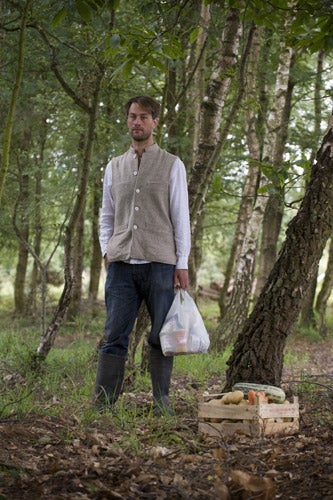First Person: 'I get my food from supermarket bins'
Tristram Stuart, 31

For the past ten years, Tristram Stuart has been foraging food from supermarket bins. Here, he explains his life as a "freegan", and why he rarely has to set foot inside a shop to stock his cupboards full of the right ingredients for any meal of his choosing.
When I was in my mid teens, growing up on a smallholding in Sussex's Ashdown Forest, I bought myself my first pig. While my dad tended to his vegetable garden, I started breeding pigs and chickens, in a bid to recreate the sustainable farming model which he grew up with in during the war. From the beginning, I wanted to feed my animals in the most sustainable way possible, so I started collecting food waste from the school kitchen, the local baker, the nearby vegetable market and a potato farmer who would give me any of his produce which was deemed to be the wrong shape and size. While that was great for me, I soon realised that the food I was feeding my animals was still perfectly fresh. This represented a serious problem: that food was going to waste at every step in the supply chain, and in most circumstances, it ended up being sent off to a landfill site to decompose unnecessarily.
Every freegan has a different set of reasons for doing what we do. Some do it as an anti-capitalist protest, while others want to limit their impact on the environment. For me, freeganism is about making one simple point: that this food should not be thrown away in the first place. By the time I was at university, I learned that I could pretty much live off food being thrown away. Every food shop, almost without exception, currently wastes food. [It is estimated that some 17 million tonnes – worth around £18bn annually – is dumped in landfill sites by the supermarkets, as it is cheaper than selling it on or giving it away.] When you open the bins of a supermarket, you could expect to find anything: cheese, yoghurts, mangoes, chicken, pizza, sausages, ready meals of every description. It often looks like someone has walked around the shop, emptying the shelves into black bags.
I don't have a problem buying food, but the majority of my food is foraged. Just like everyone else, I go shopping; the only difference is that I don't have to queue or pay at the till. Any time I go foraging, it is impossible to take all the stuff I find away with me; there is usually enough in a supermarket skip to feed 100 people. And yet, while countless people around the world are starving, this produce – sometimes well inside its shelf life – is thrown away. I am not in the business of encouraging everyone to become a freegan. Mine is a personal choice made in the hope that I can highlight some of the social issues attached to food waste.
Not only would redistributing this food alleviate world hunger, but it also would help reduce deforestation and global warming. At the moment, we are wasting nearly half of our produced food supply, and the strain that is putting on the planet's remaining agricultural land is significant. The solutions, meanwhile, are so simple, and would even benefit businesses, which wouldn't have to pay so much landfill tax. In the US, it is expected that retailers donate surplus food to charity – and while a few supermarkets in this country do this, the majority don't.
Rooting through the bins and coming across delicious food often has the hunter- gatherer in me grunting with satisfaction. Free food, after all, has been the Holy Grail of human survival for years. But this sense of satisfaction is always tainted with an overbearing outrage that this perfectly good produce is being wasted in the first place.
Tristram Stuart is the author of 'Waste: Uncovering the Global Food Scandal' (Penguin, £9.99), out now
Join our commenting forum
Join thought-provoking conversations, follow other Independent readers and see their replies
Comments
Bookmark popover
Removed from bookmarks